

The 7th global NAP Expo successfully kick-started in Gaborone, Botswana under the umbrella of the Botswana Global Adaptation Week. An estimate of 400 participants registered to the event and are composed of experts, representatives from national and sub-national governments, United Nations organizations and other international organizations, bilateral and multilateral agencies, regional centers and networks, the private sector and academia.
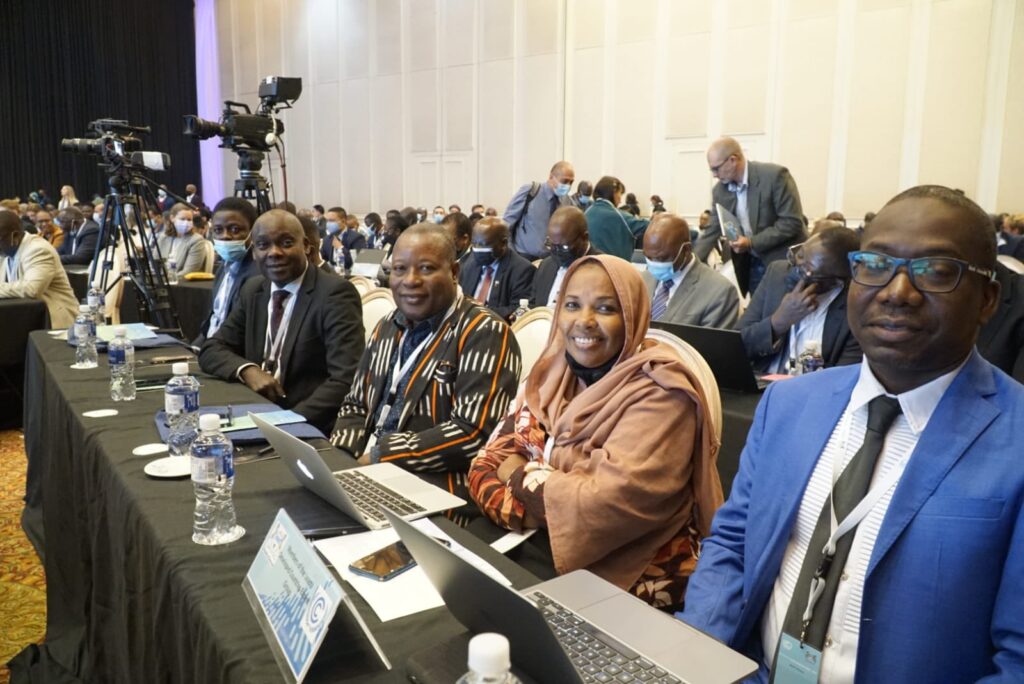
Climate change remains a current existential emergency. Climate action is NOW.
The high-level opening of the Botswana Global Adaptation Week, which also officially opens the three interrelated adaptation events of the Resilience Frontiers 2nd brainstorming meeting, the UN4NAPs Forum and the 42nd meeting of the Least Developed Countries Expert Group (LEG) was graced by high-level officials from the Government of Botswana, the UNFCCCC and the UN system in Botswana.
Deputy Executive Secretary of the UNFCCC, Mr. Ovais Sarmad, emphasized the urgency for ambitious climate action as climate change remains a current existential emergency and that the horizon for making significant transformational changes is limited to the few coming years leading up to 2030. The national adaptation plans (NAPs) are the primary way to ensure successful measures are undertaken to adapt to the impacts of climate change.
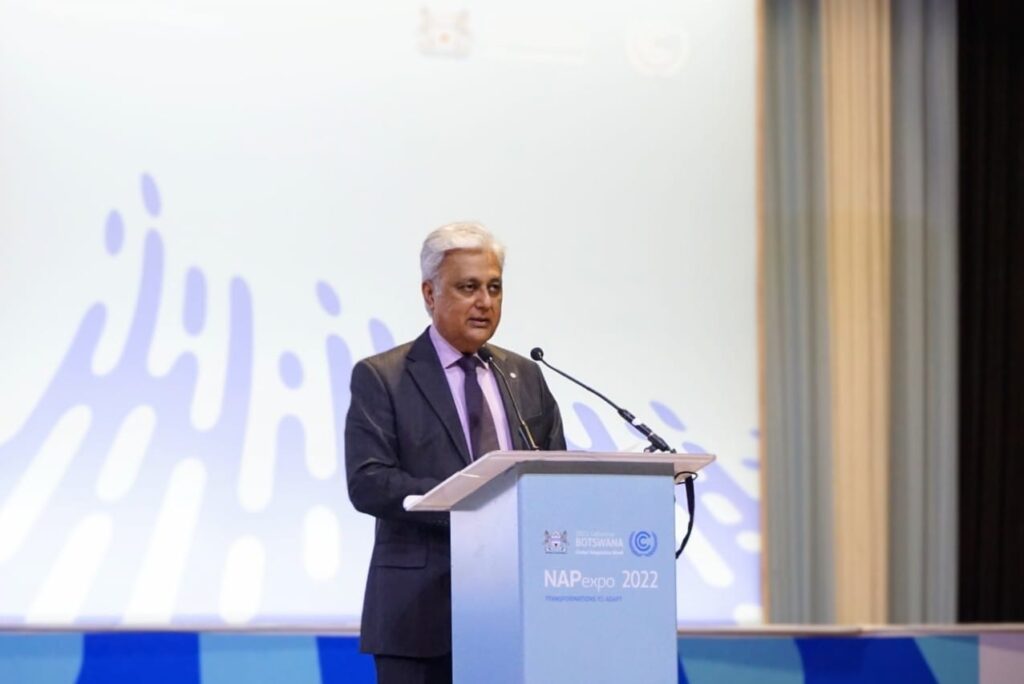
The Minister of Environment and Tourism of Botswana, Ms. Hon Philda Nani Kereng, welcomed all the delegates on behalf of His Excellency Dr. Mokgweetsi Eric Keabetswe Masisi, President of the Republic of Botswana. Botswana continues to experience the negative impacts of climate change, which particularly put biodiversity and ecosystems under threat. Therefore, hosting the NAP Expo 2022 is a great opportunity for Botswana to start developing its National Adaptation Plan. The Minister of Environment and Tourism also emphasized that to adequately implement National Adaptation Plans climate finance is crucial.
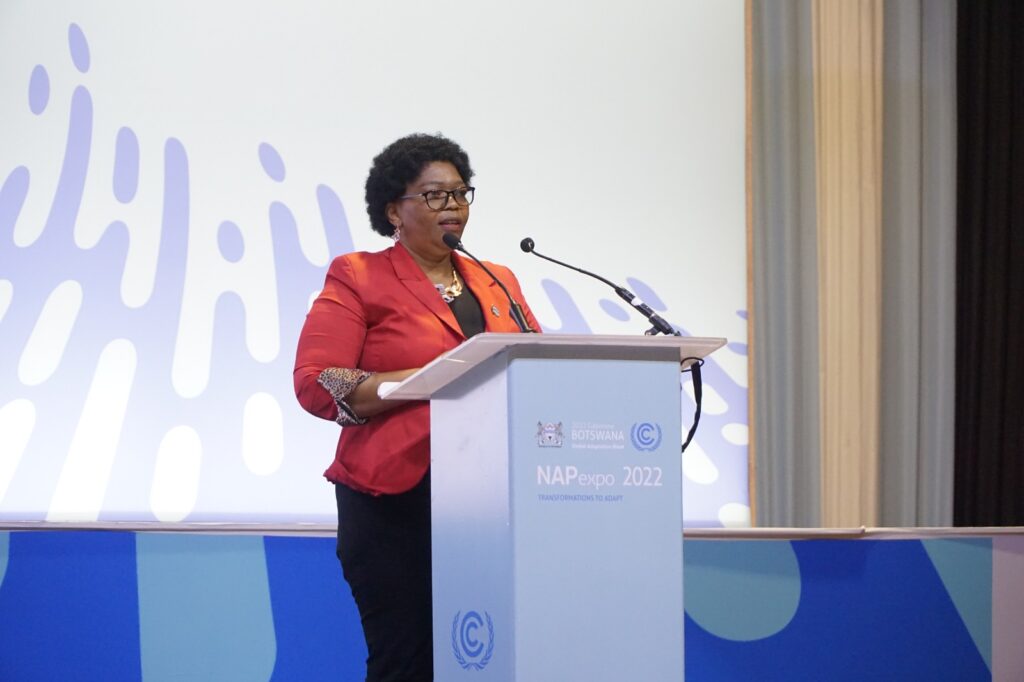
On behalf of the UN system in Botswana, Dr. Joan N. Matji, highlighted the newly adopted UN strategic country development framework, which strives to improve food security, sustainable management of natural resources, reduction of inequality and unemployment, and resilience against climate shocks and emergencies. The NAP Expo 2022 is a great opportunity for Botswana to achieve the these goals, and for all adaptation practitioners to apply foresight thinking to strengthen climate resilience and shift the paradigm.
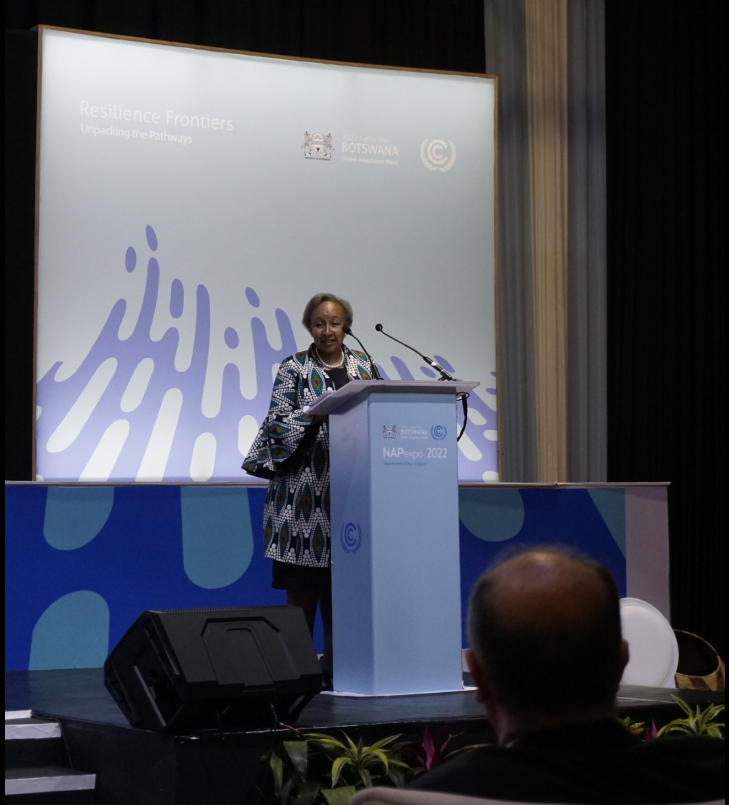
Youth for transformative adaptation action
Young people as agents of change are needed for transformative ambitious adaptation action. The Government of Botswana, hosted by UNDP Botswana and Sustain267, organized the “Transformations to Adapt: Voice of Youth” event. Deputy Executive Secretary of the UNFCCC, Mr. Ovais Sarmad, highlighted the importance of youth in the UNFCCC process, and illustrated several areas of engagement, recognizing that young people want to be meaningfully engaged, and that while there is strong leadership among people, leadership for climate action should not be left to youth alone. The Minister of Environment and Tourism, Ms. Philda Nani Kereng, encouraged the participation of youth delegates in the process, which was echoed by Ms. Bogolo Kenewendo, Special Advisor to the Climate Change Champions, who recalled that many youth delegates from Botswana took part at COP 15 and that this should happen again. The young people in the audience had the opportunity to present and share numerous innovative climate action ideas.
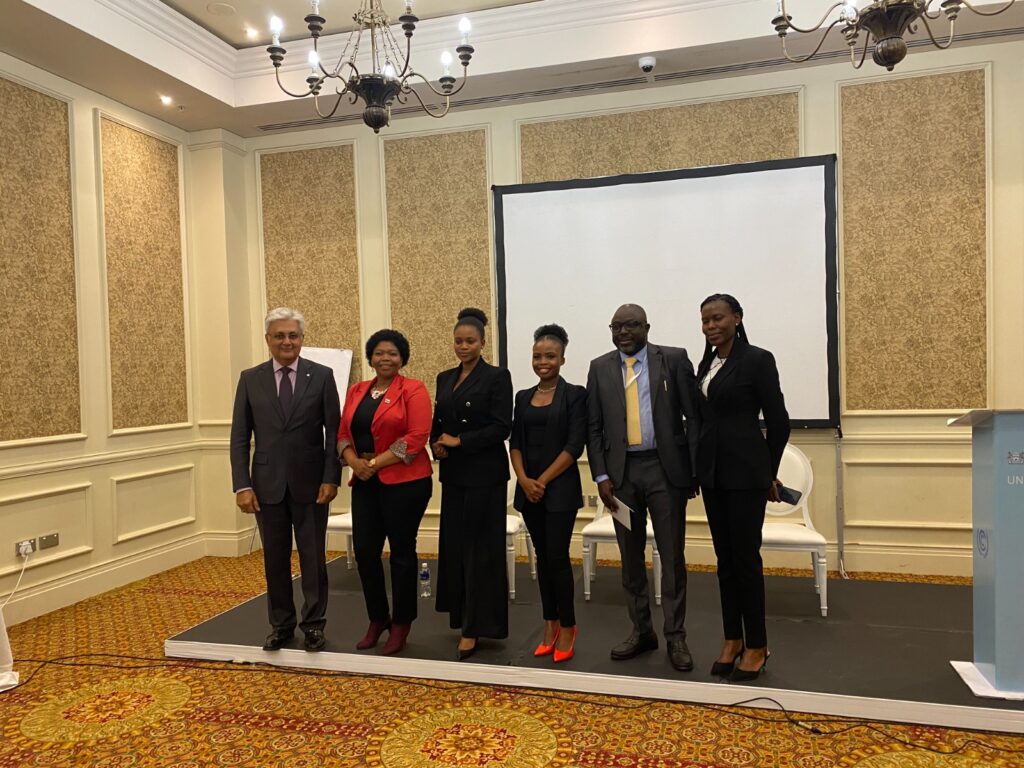
Climate adaptation ambition in the face of increasing risks from cyclones, floods and tornadoes in southern Africa
Dr. Godwell Nhamo‘s address provided a picture on increasing risk of slow onset and extreme climate events in Southern Africa. He demonstrated the destruction left behind in farmlands, infrastructure and settlements by the cyclones in the region, particularly in Malawi, Mozambique, Rwanda, South Africa, Tanzania and Zimbabwe. The frequency of such extreme climate events has steadily been rising, with a sharp increase since the turn of the century.. He emphasized the need to scale up adaptation ambition levels, and that countries need to be ready for high-level political and management buy-ins, institutional capacity, scaling-up quick and successful projects on the ground, raise awareness and establish strong collaboration networks. Prof. Godwell Nhamo reminded the audience that the call for radical transformations in adaptation through implementation of monitored, innovative and science-based National Adaptation Plans remains paramount.
Utilizing earth observations / sensing data in climate risk analysis and management”
The future of agriculture is predicated on identifying sustainable production systems that can both adapt to and mitigate changes in climate. Regions like Sub-Saharan Africa, where more than 60% of the population are smallholders farmers, are particularly vulnerable given challenges related to infrastructure, access to farming inputs and sources of information, and a rapidly changing climate.
NASA Harvest is developing novel solutions that combine street-level, scalable data collection approaches with robust field-scale analytics and satellite spaceborne observations to augment and deliver cutting-edge solutions for smallholders and the local institutions that support them. Dr. Catherine Nakalembe demonstrated the challenges of supporting food security in Africa and some of the solutions NASA Harvest is developing using machine learning and Earth observations.
Furthermore, satellite data can be used to monitor the health of plant life from space. Across key systems including land and ocean, urban, energy– EO AI can provide the evidence, and information for planning and implementing adaptation.
Today, NASA Harvest has networks of crop monitor champions- is working with agriculture departments in Kenya, Mali, Rwanda, Tanzania, and Uganda, and has reached many more countries through a regional initiative including Ethiopia, Burundi, and South Sudan where it trains regional and national analysts on how to access and use satellite information for agriculture monitoring. Kenya, Tanzania and Uganda officially own satellite based-crop monitoring programs. The benefits now surpass each country’s own efforts to know and prepare for impending events, and allow regional coordination of responses.
The first day of the NAP Expo 2022 also featured the Keynotes Speakers roundtable, in which selective strategic programmes to respond to the scale up of adaptation implementation needed in agriculture and food systems, ecosystems and urban systems, were discussed. Countries representatives noted that a holistic approach to target often marginalized and underrepresented groups, such as women, youth, and people with disabilities is vital in identifying risks and vulnerabilities when developing NAPs.
Accelerating technical and financial support for NAPs
Addressing climate change impacts requires up to date and reliable data to inform effective adaptation action. Developing and least developed countries (LDCs) have often cited difficulties of collecting data for quantitative assessment, hindering the formulation and implementation of robust adaptation projects. Dr. Catherine Nakalembe introduced the GEOGLAM Crop Monitor initiative, which provides science-driven information on crop conditions in support of early warning systems and adaptation decision-making. Dr. Catherine Nakalembe emphasized that Crop Monitor models can be used to understand past climate disasters and based on that, plan ahead. Working backwards, crop models can identify at which point crops cannot recover anymore. This information can help mobilize financial resources at the right time. However, unless there is someone constantly collecting data, it becomes difficult to understand the interlinkages between past events and future scenarios. A series of agencies joined the session and offered to provide technical and financial support to countries interested in developing projects using the crop monitor model. GCF highlighted the GCF Readiness and Preparatory Support Programme; the Commonwealth Climate Finance Access Hub (CIFA) helps countries in designing concept notes and project proposals, and provides technical capacity; and Digital Earth Africa, a GEO initiative, also provides technical capacity.
Experience of countries in implementing adaptation
The accessibility and utilization of financial resources are the key for developing countries to implement their adaptation actions. Sharing experiences on how countries succeeded in accessing funding for implementing adaptation are crucial, especially for the LDCs facing the ongoing adverse effects of climate change.
The NAP Exchange session offered an opportunity of knowledge sharing on NAP implementation in Lesotho by theme on a project basis; early warning systems, smallholder agriculture development project, forecast based financing project, and the development of adaptive capacity of vulnerable and food-insecure populations. These successful projects were given with narrative stories from representatives of Lesotho. Especially for the financial support to develop and implement adaptation projects, various financial schemes and instruments were presented, such as financial support from international funds including the AC, GCF, GEF, and IFAD, bilateral financial schemes, and beneficiary contributions. The lessons learned and experiences were also shared regarding the adaptive capacity building of vulnerable communities. It highlighted that climate resilient development of the vulnerable communities through efficient technical assistances and transfers at multiple level in Lesotho.
This is a series of sessions, and the next best practices and lessons learned will further inform design and implementation of adaptation projects under the GCF and other sources .
NAP Country Platform: Presentation of National Adaptation Plans
Since the last NAP Country Platform in November 2021 at COP 26, six countries, namely Benin, Cambodia, Central African Republic, Chad, Democratic Republic of Congo and Sierra Leone presented their NAPs at this year’s NAP Country Platform.
The NAP Country Platform is a special feature of the NAP Expo which specifically provides a platform for the countries that have submitted their NAPs to present their key priorities and communicate areas where support is needed, for instance with regard to implementation. The countries also shared lessons learned in producing their first NAP and in transitioning to the implementation phase. Benin emphasized the value of doing things in parallel rather than in sequences such as in identifying project ideas for implementation while they are still finalizing their NAP. Sierra Leone underscore the value of engaging stakeholders at the onset including the private sectors.
As more and more LDCs produce their NAPs, the LEG Chair, Kenel Delusca, encouraged them to submit their NAPs and related outputs to NAP Central as these plans provide the backdrop in providing targeted support to the LDCs on adaptation. The NAP Country Platform offers a space that both recognizes the adaptation efforts of the countries and the needs for priority adaptation action.